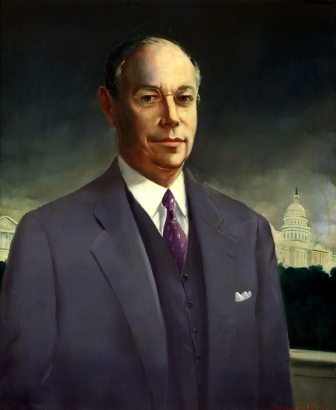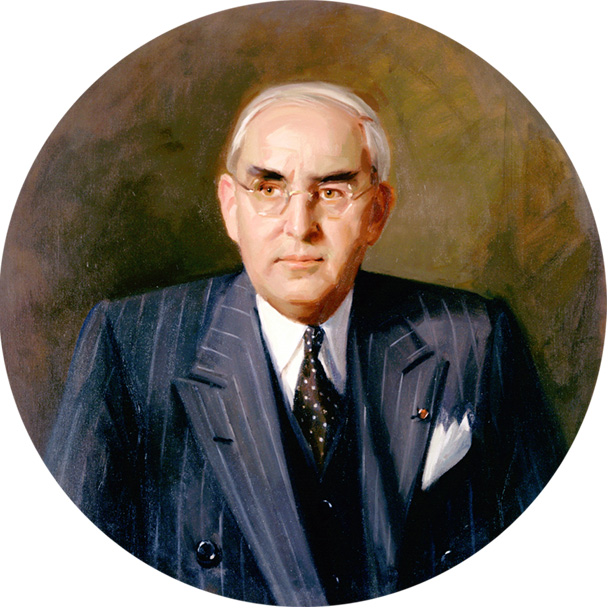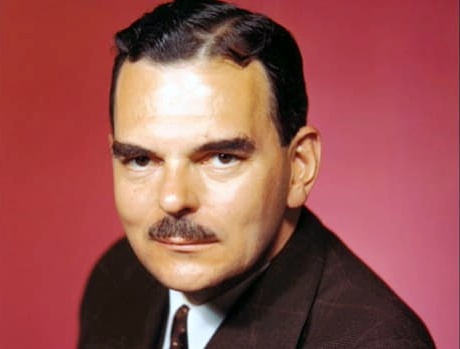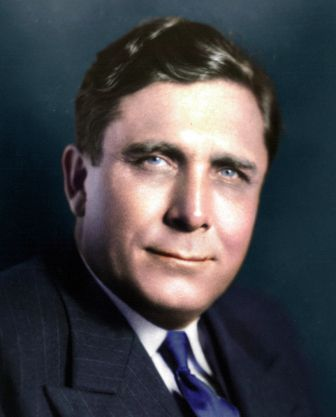
In the months leading up to the opening of the Republican National Convention '40 in Philadelphia, Pennsylvania, as with the nation in general, the Republican Party was deeply divided between the party’s isolationists, who wanted to stay out of World War II at all costs, and the party’s interventionists, who felt that the United Kingdom needed to be given all aid short of war to prevent Nazi Germany from conquering all of Europe.
The three leading candidates for the Republican nomination were all isolationists to varying degrees.

Senator Robert Alphonso Taft Sr., 50 (OH)
The elder son of William Howard Taft (27th POTUS), Robert Taft was born in Cincinnati, Ohio. He pursued a legal career in Cincinnati after graduating from Harvard Law School in 1913. Along with his brother Charles, he co-founded the law partnership of Taft Stettinius & Hollister. Taft served in the Ohio House of Representatives from 1921 to 1931 and in the Ohio Senate from 1931 to 1933. Though he lost re-election in 1932, he remained a powerful force in state and local politics. Taft was elected as U.S. Senator in 1938. As Senator, he led the Conservative Coalition that opposed the New Deal. He saw his mission as not only stopping the growth of the New Deal but also eliminating many of its government programs. A staunch non-interventionist, Taft believed that America should avoid any involvement in European or Asian wars and concentrate instead on solving its domestic problems. He believed that a strong military, combined with the natural geographic protection of the Atlantic and Pacific Oceans, would be adequate to protect America even if Germany overran all of Europe. His main strength is in his native Midwest and parts of the South.

Senator Arthur Hendrick Vandenberg, 56 (MI)
Born and raised in Grand Rapids, Michigan in a family of Dutch Americans, Vandenberg began his career as a newspaper editor and publisher. In 1928, Republican Governor Fred Green appointed Vandenberg to the Senate to fill the vacancy that arose after the death of Woodbridge Nathan Ferris. Vandenberg won election to a full term later that year and became the senior Republican in the Senate. When the new Congress convened in 1935, there were only twenty-five Republican senators, and Vandenberg was one of the most effective opponents of the second New Deal. He voted against most Roosevelt-sponsored measures (except for the Banking and the Social Security Acts). He pursued a policy of fiscal responsibility, a balanced budget, states’ rights, and reduced taxation. He felt that President Roosevelt had usurped the powers of Congress, and he spoke of the “dictatorship of Roosevelt”. But at the 1936 Republican National Convention, Vandenberg refused to permit the party to nominate him for Vice President, anticipating Roosevelt’s victory that year. As part of the conservative coalition of Republicans and Democrats in the Senate, Vandenberg helped defeat Roosevelt’s plan to pack the Supreme Court. He helped defeat the Passamaquoddy Bay tidal power and Florida Canal projects, voted against the National Labor Relations Act, various New Deal tax measures, and the Hours and Wages Act. He supported the Neutrality Acts but wanted and sponsored more severe bills designed to renounce all traditional neutral rights and restrict and prevent any action by the President that might cause the United States to be drawn into war. Except for advocating aid to Finland and urging a quid pro quo in the Far East to prevent a war with Japan, his position was consistently isolationist.

District Attorney of New York County Thomas Edmund Dewey, 38 (NY)
As a New York City prosecutor and District Attorney, Dewey had risen to national fame as the “Gangbuster” prosecutor who had sent numerous infamous mafia figures to prison. Most famously, he successfully prosecuted Mafioso kingpin Charles “Lucky” Luciano on charges of forced prostitution in 1936. Luciano was given a thirty-year prison sentence. He also prosecuted and convicted Waxey Gordon on charges of tax evasion. Dewey almost succeeded in apprehending mobster Dutch Schultz as well, but not before Schultz was murdered in 1935 in a hit ordered by The Commission itself.
However, each of these candidates had weaknesses that could be exploited. Taft’s outspoken isolationism and opposition to any American involvement in the European war convinced many Republican leaders that he could not win a general election, particularly as France fell to the Nazis in May 1940 and Germany threatened the United Kingdom. Dewey’s relative youth and lack of any foreign-policy experience caused his candidacy to weaken as the Wehrmacht emerged as a fearsome threat. Vandenberg was also an isolationist and his lackadaisical, lethargic campaign never caught the voters’ attention.
This left an opening for a dark horse candidate to emerge.

Enter Wendell Lewis Willkie, 48, a Wall Street-based industrialist, who had never before run for public office.
He was a former Democrat who had been a pro-Roosevelt delegate at the 1932 Democratic National Convention. Willkie had first come to public attention as an articulate critic of Roosevelt’s attempt to break up electrical power monopolies. Willkie was the CEO of the Commonwealth and Southern power company, and he opposed the federal government’s attempts to compete with private enterprise, claiming that the government had unfair advantages over private companies. Willkie did not dismiss all Roosevelt’s social welfare programs, and in fact he supported those he believed free enterprise could not do better. Furthermore, unlike the leading Republican candidates, Willkie was a forceful and outspoken advocate of aid to the Allies, especially Britain. His support of giving all aid to the British “short of declaring war” won him the support of many Republicans on the East Coast, who disagreed with their party’s isolationist leaders in Congress. Willkie’s persuasive arguments impressed these Republicans, who believed that he would be an attractive presidential candidate. Many of the leading media magnates of the era, such as Ogden Reid of the New York Herald Tribune, Roy Howard of the Scripps-Howard chain and John and Gardner Cowles, publishers of the Minneapolis Star and the Minneapolis Tribune, as well as the Des Moines Register and Look magazine, supported Willkie in their newspapers and magazines.
Even so, Willkie remained a long-shot candidate.
GALLUP POLL - MAY 8
REPUBLICAN PRESIDENTIAL CANDIDATESInterviewing Date 4/25-30/40
Survey #192-K. Question #1a
Asked of Republicans: Whom would you like to see the Republican party nominate for President this year?
Dewey… 67%
Vandenberg… 14%
Taft… 12%
Willkie… 3%
Hoover… 2%
Others… 2%
No opinion… 28%
The Nazi Army’s rapid blitz into France in May 1940 shook American public opinion, even as Taft was telling a Kansas audience that America must concentrate on domestic issues to prevent Roosevelt from using the international crisis to extend socialism at home. Both Dewey and Vandenburg also continued to oppose any aid to Britain that might lead to war with Germany. Nevertheless, sympathy for the embattled British was mounting daily, and this aided Willkie’s candidacy.
GALLUP POLL - JUNE 12
REPUBLICAN PRESIDENTIAL CANDIDATESInterviewing Date 5/25-30/40
Survey #196-K. Question #12a
Asked of Republicans: Whom would you like to see elected President this year?
Dewey… 52%
Willkie… 17%
Taft… 13%
Vandenberg… 12%
Hoover… 2%
Landon… 1%
Others… 3%
No opinion… 21%
Fueled by his favorable media attention, Willkie’s pro-British statements won over many of the delegates.
GALLUP POLL - JUNE 21
REPUBLICAN PRESIDENTIAL CANDIDATESInterviewing Date 6/9-14/40
Survey #198-K Question #10a
Asked of Republicans: Whom would you like to see elected President this year?
Dewey…47%
Willkie… 29%
Taft… 8%
Vandenberg… 8%
Hoover… 6%
Others… 2%
No opinion… 34%
As the delegates were arriving in Philadelphia, hundreds of thousands, perhaps as many as one million, telegrams urging support for Willkie poured in, many from “Willkie Clubs” that had sprung up across the country. Millions more signed petitions circulating everywhere.
Results of the Republican primaries
| Date | Primary | Thomas Dewey | Jerrold Seawell | Robert A. Taft | Charles McNary | Ryan N. Davis | Arthur Vandenberg | Wendell Willkie | Arthur James | Herbert Hoover | Unpledged |
|---|---|---|---|---|---|---|---|---|---|---|---|
| March 12 | New Hampshire | 0% | 0% | 0% | 0% | 0% | 0% | 0% | 0% | 0% | 100% |
| April 2 | Wisconsin | 73% | 0% | 0% | 0% | 0% | 27% | 0% | 0% | 0% | 0% |
| April 9 | Illinois | 100% | 0% | 0% | 0% | 0% | 0% | 0% | 0% | 0% | 0% |
| April 9 | Nebraska | 59% | 0% | 0% | 0% | 0% | 41% | 0% | 0% | 0% | 0% |
| April 23 | Pennsylvania | 67% | 0% | 7% | 0% | 0% | 3% | 1% | 10% | 1% | 0% |
| April 30 | Massachusetts | 0% | 0% | 0% | 0% | 0% | 0% | 0% | 0% | 0% | 100% |
| May 5 | South Dakota | 0% | 0% | 0% | 0% | 0% | 0% | 0% | 0% | 0% | 100% |
| May 6 | Maryland | 100% | 0% | 0% | 0% | 0% | 0% | 0% | 0% | 0% | 0% |
| May 7 | California | 0% | 100% | 0% | 0% | 0% | 0% | 0% | 0% | 0% | 0% |
| May 14 | Ohio | 0% | 0% | 100% | 0% | 0% | 0% | 0% | 0% | 0% | 0% |
| May 14 | West Virginia | 0% | 0% | 0% | 0% | 100% | 0% | 0% | 0% | 0% | 0% |
| May 17 | Oregon | 4% | 0% | 0% | 96% | 0% | 0% |
